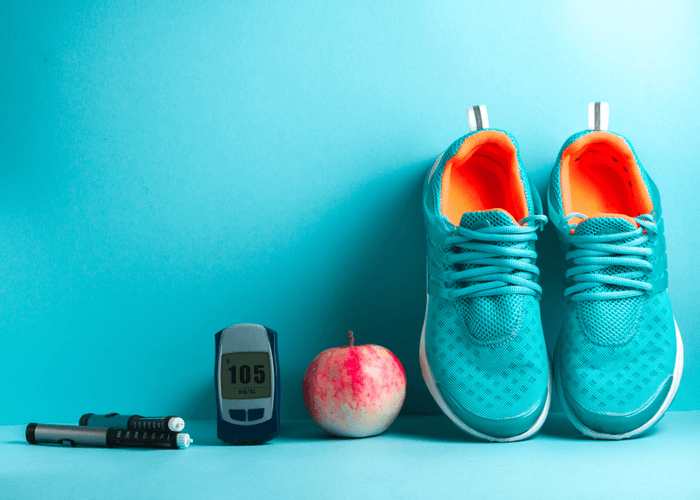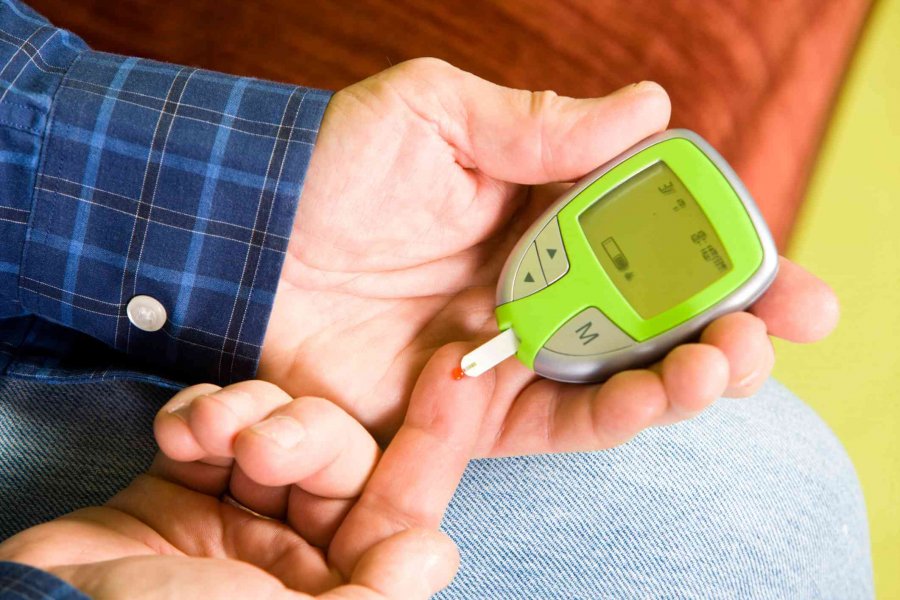Running Safely With Diabetes

Exercise is an important aspect of a healthy lifestyle for most people. Whether you are young or old, regularly active or inactive and just starting out, movement is simply good for your body and soul.
However, some people with medical conditions need to exercise some caution when engaging in a new exercise regiment.
Running with diabetes is a perfect example of people who may benefit greatly from the activity but should learn a few things before starting out.
Is Running Good For Diabetics?
According to Harvard Health, running is an excellent form of exercise for both type 1 and type 2 diabetics. Aerobic activity in adults who had previously been relatively sedentary proves helpful in improving insulin reaction.
Regular exercise can improve blood sugar levels, help manage weight and also improve heart health. These things are positives for everyone, including diabetics!
Running With Diabetes Type 1
Type 1 diabetes, also known as juvenile diabetes, is a condition where the pancreas produces little or no insulin. Different factors are thought to cause this condition, such as genetics and some viruses. Although there is no cure for type 1 diabetes, modern medicine has come a long way toward helping those afflicted live normal lives.
The invention of an insulin pump, a mechanism that delivers short doses of insulin throughout the day, has made it possible for many diabetics to no longer have to endure multiple insulin pokes each and every day.

Equip with a sensor that constantly monitors the glucose levels, the device helps many people feel freedom from the pokes of blood testing and insulin injection.
Prior to running, a diabetic should always check blood sugar. If your blood sugar is less than 100 mg/dl, you should have a snack before exercising. You will want to have a protein snack that you normally would not need to dose insulin for.
An example of a good snack is some Greek yogurt and berries.
Type 2 Diabetics
Type 2 diabetes is when your body does not control or use insulin properly. Since risk factors for this type of diabetes include being overweight, excess fat distribution in the abdomen area, family history and inactivity, you can often overcome this type of diabetes.
Yes, you read that correctly. With weight loss, diet modification and exercise, some people can reverse type 2 diabetes.
Running with diabetes type 2 is similar to those with type one. You need to monitor your sugars, be smart about fueling before, during and after workouts, and keep a workout journal.
What Things Need To Be Considered
First and foremost, anyone starting a new exercise regiment should speak to their physician. This is especially important for a diabetic.
Your pre-workout blood sugar is important. You also need to consider when you last ate as well as your last dose of insulin. If you are planning to exercise for more than 30 minutes, you should plan to need a snack of some sort while running.

It is typical for your physician to encourage a new runner to check sugar before, during and after activity. Although over time you will get acclimated to how your body will react, this does take time and should not be assumed.
Once you learn how your body will likely react to certain workouts, you can modify your fueling and insulin accordingly. However, as a diabetic, you know that surprises can always happen. Because of this, you should always carry both fuel and insulin in case of an emergency.
In addition, it is advisable for an insulin-dependent diabetic to work out with a running buddy (or in a gym where help is readily available).
Keep A Training Log
While most runners keep a training log, for a diabetic runner this is even more important. Your training log should include what you ate prior to running, blood sugar levels, workout intensity, any anomaly during the workout (blood sugar or heart rate fluctuations) as well as post-workout blood sugar levels. In addition, you should note any snack, fuel or fluids you take in during the run.
The more thorough you are with your training log, the greater the likelihood that you will be able to anticipate problems with your blood sugar fluctuation before it happens.
How Does Running Affect Blood Sugar?
When we exercise, our bodies need extra energy. This energy derives from glucose, found in blood sugar. For many people, regular exercise will lower blood sugar. However, for other people, vigorous exercise and activity can cause a spike in sugar levels.

These are reasons why diabetics need to be especially diligent about monitoring glucose levels before, during and after physical activity. This is especially true of those new to working out.
Is Running Good For Insulin Resistance?
The answer is yes! Regular exercise is one of the best ways to improve insulin resistance. Other natural ways to achieve this are:
- Get a good night’s sleep regularly.
- Lower your stress level.
- Lose weight.
- Eat a healthier diet including colorful fruits and vegetables.
- Cook with cinnamon.
- Drink green tea.
- Eat fewer carbohydrates.
- Limit trans fats.
Can Running Reverse Diabetes?
Running can reverse type 2 diabetes, but not type 1. Unfortunately, there is no cure for type one diabetes. Type two, on the other hand, can often be reversed through diligent diet, exercise and, for some, weight loss.
Diabetics And Running
If you are a diabetic and you have been considering adding more physical activity to your life, running may be just the ticket for you. As long as you are smart about monitoring sugars and properly fueling your body, you can find yourself reaping the benefits of this fantastic workout.
If you are a type 2 diabetic, you may even find yourself with the good fortune of getting to throw away the insulin, if you can get your diabetes under control through exercise, diet and weight loss.
Even type 1 diabetics can benefit from regular exercise. True, exercise is not a magic bullet to make your diabetes cease to exist, but you may find yourself feeling better overall.
Sources
- , 14 Natural Ways to Improve Your Insulin Sensitivity, Health Website
- , Exercise & Type 1, Org
Latest Articles
 Is Running on a Treadmill Easier Than Running Outside?Runners have their own preferences, whether it is treadmill running, running outside on the road, or exploring trails. So...
Is Running on a Treadmill Easier Than Running Outside?Runners have their own preferences, whether it is treadmill running, running outside on the road, or exploring trails. So... Is It OK to Use Trail Running Shoes on the Road?While trail running shoes can be used on roads, especially in situations where a runner encounters mixed terrains or pref...
Is It OK to Use Trail Running Shoes on the Road?While trail running shoes can be used on roads, especially in situations where a runner encounters mixed terrains or pref... How to Fix Sore Quads After Running?Rest, ice, gentle stretching, and over-the-counter pain relievers can help soothe sore quads after running. Also, ensure ...
How to Fix Sore Quads After Running?Rest, ice, gentle stretching, and over-the-counter pain relievers can help soothe sore quads after running. Also, ensure ... 10 Fruits With The Most Electrolytes to Replace Sports DrinksThese fruits are high in electrolytes such as potassium, magnesium, and calcium, essential for hydration, muscle function...
10 Fruits With The Most Electrolytes to Replace Sports DrinksThese fruits are high in electrolytes such as potassium, magnesium, and calcium, essential for hydration, muscle function...

